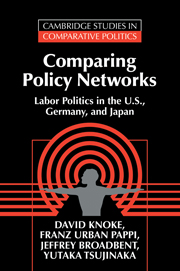Book contents
- Frontmatter
- Contents
- List of tables and figures
- Preface
- Acknowledgements
- 1 Policy-making in the Organizational State
- 2 Three Labor Policy Domains
- 3 Finding Domain Actors
- 4 Organizational Policy Interests
- 5 Policy Webs: Networks, Reputations, and Activities
- 6 Fighting Collectively: Action Sets and Events
- 7 Exchange Processes
- 8 Power Structures
- 9 Variations on a Theme of Organizational States
- Appendix 1 Legislative Procedures in Three Nations
- Appendix 2 Labor Policy Domain Organizations by Type
- Appendix 3 Cluster Analyses of Labor Policy Domain Issues
- Appendix 4 Labor Policy Domain Legislative Bills
- References
- Index
6 - Fighting Collectively: Action Sets and Events
Published online by Cambridge University Press: 05 June 2012
- Frontmatter
- Contents
- List of tables and figures
- Preface
- Acknowledgements
- 1 Policy-making in the Organizational State
- 2 Three Labor Policy Domains
- 3 Finding Domain Actors
- 4 Organizational Policy Interests
- 5 Policy Webs: Networks, Reputations, and Activities
- 6 Fighting Collectively: Action Sets and Events
- 7 Exchange Processes
- 8 Power Structures
- 9 Variations on a Theme of Organizational States
- Appendix 1 Legislative Procedures in Three Nations
- Appendix 2 Labor Policy Domain Organizations by Type
- Appendix 3 Cluster Analyses of Labor Policy Domain Issues
- Appendix 4 Labor Policy Domain Legislative Bills
- References
- Index
Summary
We continue to investigate labor policy domain events, turning to the social structure of organizations' interests and their participation in specific legislative bills debated during the 1980s in the Congress, Bundestag, and Diet. After briefly reviewing the major policies that arose in each legislature, we examine the advocacy circles and action sets that formed around each event. The results set the stage for further inquiries into the dynamics of collective decision making on legislative events in Chapter 7.
LEGISLATIVE EVENTS OF THE 1980s
Because business interests dominated policy-making during the Reagan, Kohl, and Nakasone governments, legislation favoring labor and minority group interests had a difficult time reaching the national agendas. In the U.S., despite decades of divided presidential and congressional government, Republican control of the Senate in Reagan's first six years thwarted any serious effort by organized labor and its allies to push for progressive social legislation. In Germany and Japan, where the parliamentary form of government assured a basic unity between executive and legislative branches (see Appendix 1), no major challenge to conservative interests could arise. Consequently, labor politics of the 1980s was a matter of negative changes rather than major upheavals from the labor side. In some cases, conservative political actors took the offensive along with business against labor, justifying their attacks by neoliberal ideologies of “administrative reform” or deregulation. They further justified this offensive by the need to respond to globalization, trade liberalization, and the information society.
- Type
- Chapter
- Information
- Comparing Policy NetworksLabor Politics in the U.S., Germany, and Japan, pp. 123 - 151Publisher: Cambridge University PressPrint publication year: 1996



